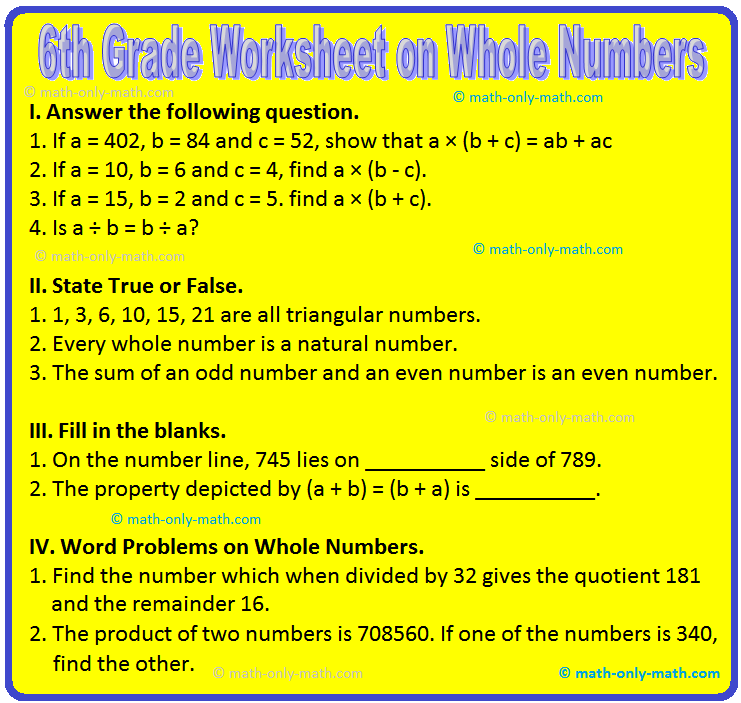Subscribe to our ▶️ YouTube channel 🔴 for the latest videos, updates, and tips.
6th Grade Worksheet on Whole Numbers
In 6th Grade Worksheet on Whole Numbers contains various types of questions on whole numbers, successor and predecessor of a number, number line, addition of whole numbers, subtraction of whole numbers, multiplication of whole numbers, division of whole numbers, properties of whole numbers, properties of addition, properties of subtraction, properties of multiplication, properties of division, even and odd whole numbers, patterns in whole numbers and word problems on whole numbers.
I. Multiple Choice Questions on Whole Numbers (MCQ)
Tick (✔) the correct option.
1. The smallest natural number and smallest whole number are respectively
(i) 0 and 1
(ii) 1 and 0
(iii) 0 and 0
(iv) 1 and 1
2. The value of 45 × 15 × 6 × 3 × 0 × 19 is
(i) 4800
(ii) 0
(ⅲ) 9801
(iv) 6000
3. The identity element with respect to multiplication is
(i) 0
(ii) 9
(ii) 1
(iv) All of these
4. The whole number which does not have a predecessor is
(i) 1
(ii) 0
(iii) 101
(iv) 9
5. Additive identity for whole number is
(i) 0
(ii) 1
(iii) 10
(iv) All of these
Answer:
A. 1. (ii) 1 and 0
2. (ii) 0
3. (ii) 1
4. (ii) 0
5. (i) 0
II. State True or False:
1. 1, 3, 6, 10, 15, 21 are all triangular numbers.
2. Every whole number is a natural number.
3. The sum of an odd number and an even number is an even number.
4. Commutativity and associativity are properties of addition of whole numbers.
5. 200569 × 0 = 200569
Answer:
B. 1. True
2. False
3. False
4. True
5. False
III. Fill in the blanks.
1. There is a whole number, which, when added to itself gives that number, is __________.
2. On the number line, 745 lies on __________ side of 789.
3. The property depicted by (a + b) = (b + a) is __________.
4. __________ is called additive identity for whole number.
Answer:
C. 1. zero.
2. left
3. Commutativity
4. zero
IV. Answer the following question.
1. If a = 402, b = 84 and c = 52, show that a × (b + c) = ab + ac
2. If a = 10, b = 6 and c = 4, find a × (b - c).
3. If a = 15, b = 2 and c = 5. find a × (b + c).
4. Is a ÷ b = b ÷ a?
5. If a = 8 and b = 5, show that a - b ≠ b - a.
6. Find the number which when divided by 32 gives the quotient 181 and the remainder 16.
7. The product of two numbers is 708560. If one of the numbers is 340, find the other.
8. On dividing 64280 by a certain number, the quotient is 4589 and the remainder is 34. Find the divisor.
Answer:
IV. 1.
2. 20
3. 105
4. No, Division is not commutative for (non-zero) whole numbers.
5. 8 - 5 ≠ 5 - 8 ⟹ 3 ≠ -3
6. 5808
7. 2084
8. 14
6th Grade Worksheet on Whole Numbers
V. State the property used in each case.
(i) 3568 × 0 = 0
(ii) 15 × 22 = 22 × 15
(iii) (41 × 23) is a whole number.
(iv) 8956 × 1 = 8956
(v) (23 × 84) × 45 = 23 × (84 × 45)
(vi) 83 × (42 + 5) = 83 × 42 + 83 × 5
(vii) 267 × (32 - 19) = 267 × 32 - 267 × 19
Answer:
V. (i) Multiplicative property of Zero
(ii) Commutative law of Multiplication
(iii) Closure Property of Multiplication
(iv) Multiplicative Identity of Multiplication
(v) Associative Law of Multiplication
(vi) Distributive Property of Multiplication Over Addition
(vii) Distributive Property of Multiplication Over Subtraction.
Numbers Page
6th Grade Page
From Properties of Whole Numbers to HOME PAGE
Didn't find what you were looking for? Or want to know more information about Math Only Math. Use this Google Search to find what you need.



New! Comments
Have your say about what you just read! Leave me a comment in the box below. Ask a Question or Answer a Question.